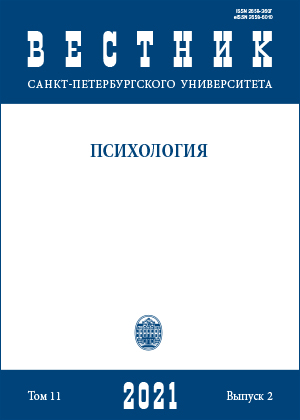Features of parent-child interaction and behavioral problems among children with autism spectrum disorder
DOI:
https://doi.org/10.21638/spbu16.2021.204Abstract
The article presents the results of a study of behavioral features of children with autism spectrum disorder (ASD) in connection to the characteristics of psychological interaction of children and their mothers. It previously has been found that children with ASD demonstrate more communicative and social activity, have less pronounced symptoms of autism, if their parents show a high level of sensitivity to the needs of children and are emotionally involved in interaction with them. The study’s participants consisted of 29 children with ASD (average age: 52,4 ± 8,9 months) who were diagnosed by a psychiatrist during examination in the Stavropol Clinical Psychiatric Hospital no. 1. The comparison group included 36 typically developing children (average age: 39,7 ± 12,1 months). The PCERA method, with a video recording of mother — child interactions, was used for assessing qualities of interaction in children with ASD. Behavioral difficulties were evaluated using the CBCL/1.5-5 questionnaire. The results of the study suggest that low sensitivity to child’s cues, high intrusiveness and negative affect in mothers, and low level of reciprocity and enjoyment in the dyadic relationship are linked to borderline/clinical levels on several DSM-oriented scales (“Affective Disorders”, “Pervasive Developmental Problems”, “Oppositional Defiant Problems”) and syndrome scales (“Emotionally Reactive”, “Anxious/Depressed”, “Aggressive Behavior”) in children with ASD.
Keywords:
autism, parent-child interaction, CBCL/1½-5
Downloads
References
St. Petersburg — USA Orphanage Research Team. The Effects of Early Social-Emotional and Relationship Experience on the Development of Young Orphanage Children. (2008) Monographs of the Society for Research in Child Development, 73 (3). https://doi.org/10.1111/j.15405834.2008.00483.x
Downloads
Published
How to Cite
Issue
Section
License
Articles of "Vestnik of Saint Petersburg University. Psychology" are open access distributed under the terms of the License Agreement with Saint Petersburg State University, which permits to the authors unrestricted distribution and self-archiving free of charge.




